You probably don’t notice it right away. It might creep up after you've been sitting at your desk for hours, chipping away at your daily to-dos. Or perhaps it's because you always carry your backpack on your right side or take calls by squeezing your phone between your shoulder and ear.
Whatever the reason, sooner or later it hits you: Your shoulders are scrunched, your neck hurts, and your muscles feel tight.
“The neck and upper back area hold a lot of tension,” says Karena Wu, a physical therapist and owner of ActiveCare Physical Therapy in New York. “The amount of time spent with forward head and shoulder posturing increases the stress on the soft tissue and joints in the area.”

In other words, sitting at a computer all day with our head and neck in the same position leaves us with tight, stiff, and sore shoulders. And our sedentary jobs aren't the only issue. Stress can add to the problem: When people experience high levels of it, the rib cage can drop slightly, causing the shoulders and upper back to round forward into a slouch.
More Than Just Your Shoulders
"You have to remember that the shoulder is not just a joint on its own; it's part of the neck, the ribs, the scapula—it's a whole complex," says Marianne Ryan, a physical therapist and author of the book Baby Bod.
Here's a quick anatomy lesson: The shoulder complex includes the humerus, clavicle, thoracic region of your spine, rib cage, and perhaps most importantly, your scapula (or shoulder blade). The upside to all this complexity is a huge range of motion in our upper body (think: nailing wheel pose and throwing curve balls). The downside: The whole area depends on ligaments and muscles for stability—as opposed to the "ball-and-socket" stability our hips get. When those muscles get overused (or misused), we're left with limited motion and stiffness.
"All four [shoulder] joints need to be working appropriately and efficiently in order to have pain-free, functional range of motion," Wu says. The best approach is to move frequently—forward, backward, and to the sides throughout the day. But if you are feeling stiff by 5:00 p.m., we've rounded up 16 easy stretches to try.
Sit up Straight
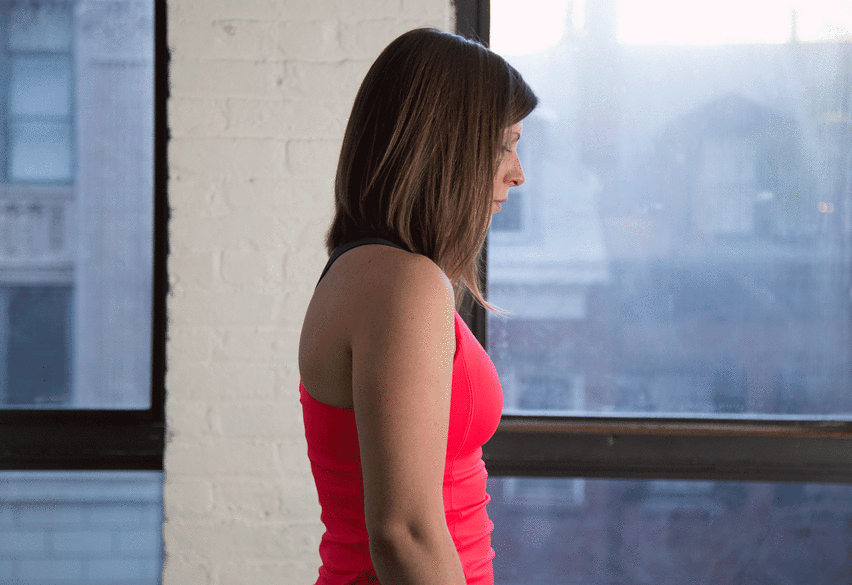
While all of the moves on this list will help loosen your shoulders, relieve tension, and increase flexibility, this should be your first stop. Think of it as the gateway to the rest of the exercises.
“This move helps someone find their good, upright postural position and moves the spinal column and soft tissues to increase circulation and blood flow,” Wu says.
From a standing position, slouch slightly forward. No need to overdo this part, Wu says, because we’re already biased to move in this direction. Now, overcorrect to an upright position with a slight bend to the upper back (without putting pressure on the neck or low back). Our model, physical therapist Rebecca Young, suggests placing your thumb between your shoulder blades to make sure you’re feeling the movement in the right place: your upper back and shoulder blades. Repeat 3 to 5 times in each direction.
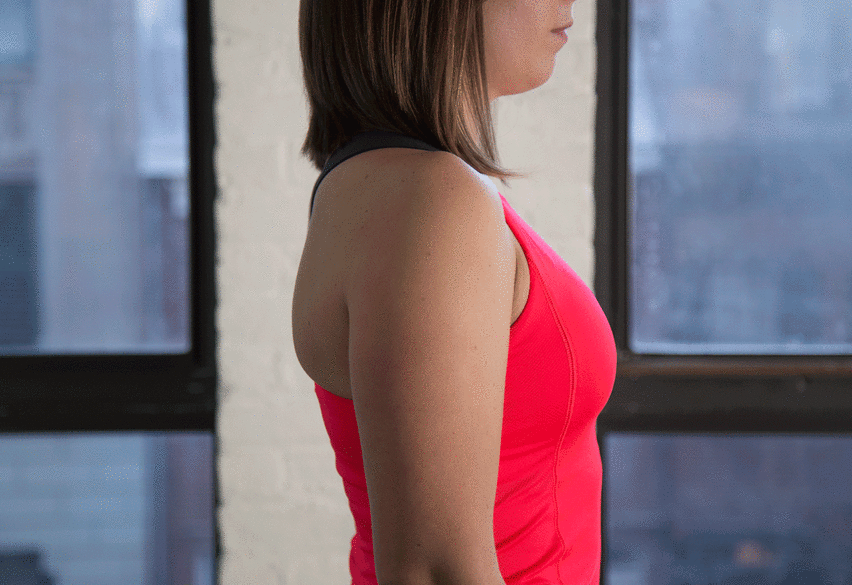
This move sounds easy enough, but we bet you’ll need to concentrate on isolating your shoulder blades (and not simply moving your shoulders up and down).
Start in a comfortable standing position with arms at your side. Move your shoulder blades up, then out (pushing away from your body), then down. You only need to move about one centimeter in each direction. Maintain proper postural alignment throughout the exercise. Hold each position for 10 seconds or longer.
Shoulder Stretches
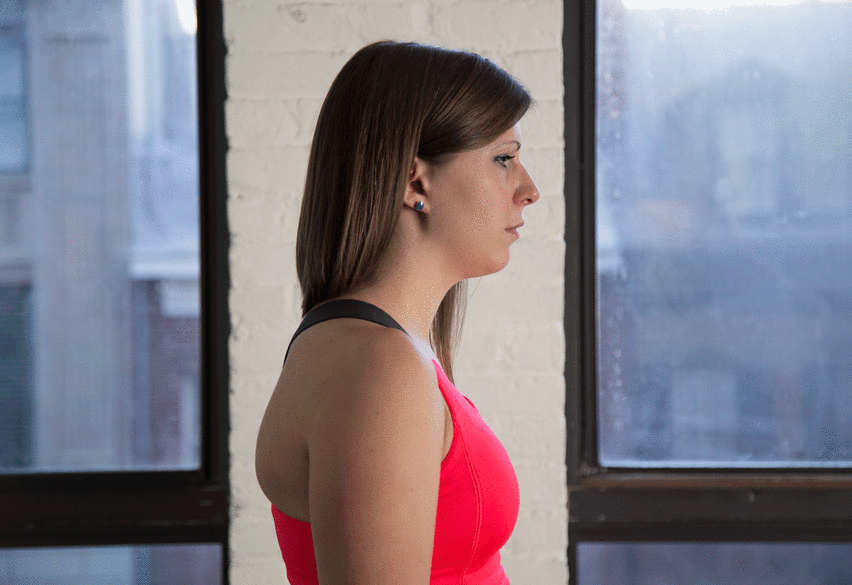
Go ahead, embrace your double chin. This move is especially great for people who hold their neck in the same position for long periods of time (i.e., staring at a computer for eight hours a day). Move your chin forward, then slowly pull it back by slightly tucking it in toward your throat. Try to keep chin parallel to the floor and straight (not tipping it up or down). Repeat hourly up to 10 times.
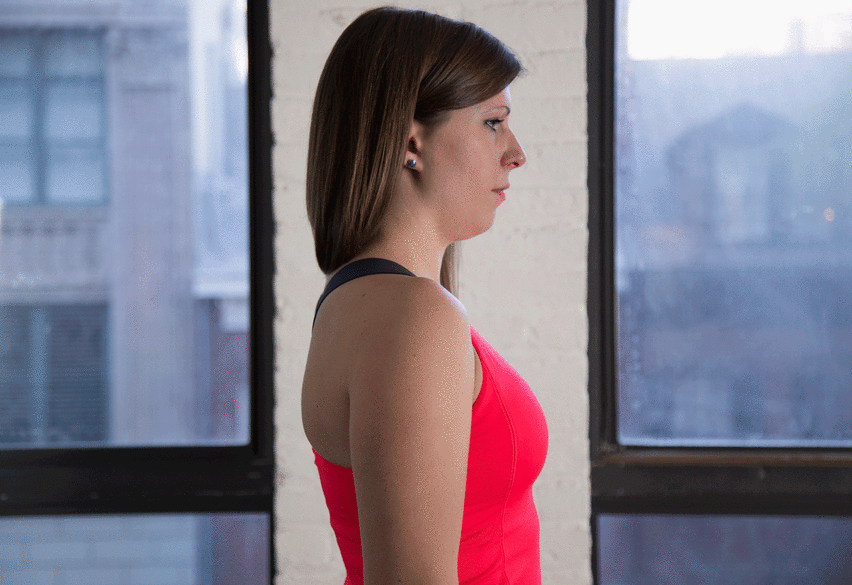
From a position of proper alignment, roll shoulders up, then back, then down in a fluid motion. Repeat this movement about 10 times, then reverse it, rolling forward about 10 times.
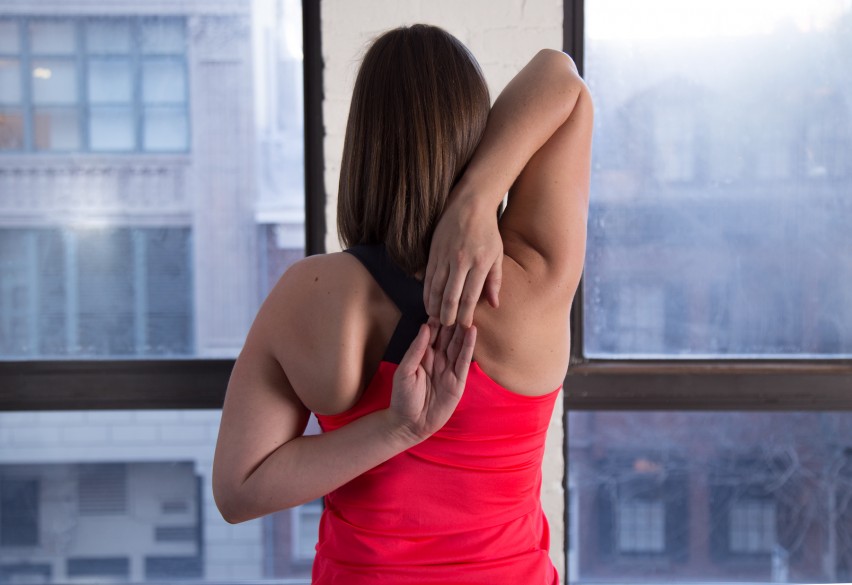
Reach right arm straight up, then bend elbow and let hand fall behind your head. Move left arm behind the back and bend the arm, letting the back of your left hand rest against the right shoulder blade (or as close to the blade as possible). Reach to grab right fingertips with the left hand. Repeat on the other side.
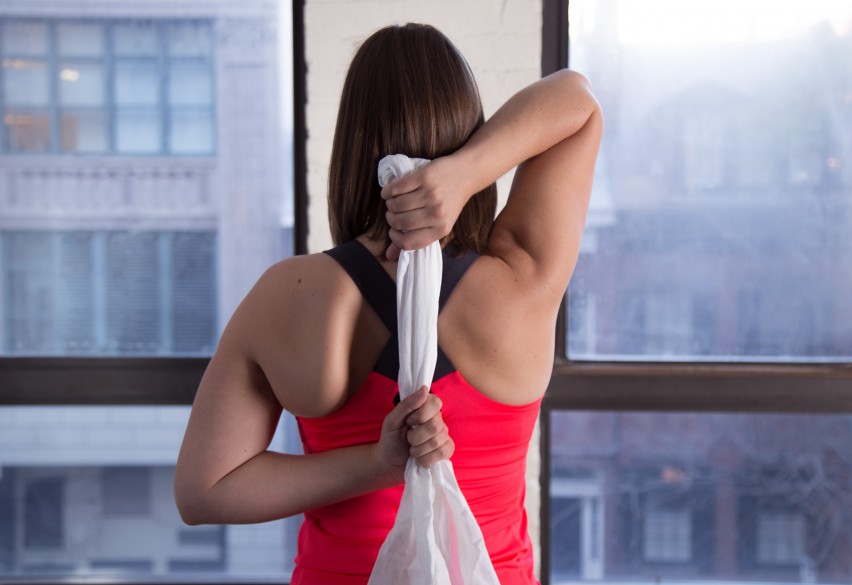
Make it easier: If you cannot reach the fingertips of the opposite hand, use a towel to assist, creating a light amount of tension by gently pulling on the towel in opposite directions.
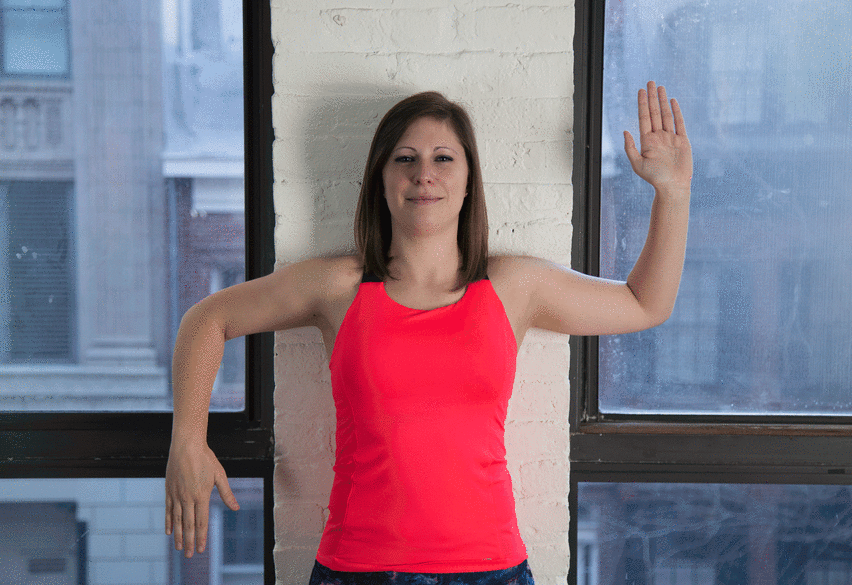
With your back to a wall, allow scapula to rest in a neutral position and bring both elbows out to 90 degrees (so the sides of your biceps are in contact with the wall). Without moving the position of your elbows, turn right arm upward, so back of the right hand touches the wall, and left arm downward, so left palm touches the wall (or they come as close as possible). Slowly switch (right arm up, left arm down; then left arm up, right arm down) for about 30 seconds, trying to keep arms at 90 degrees throughout.
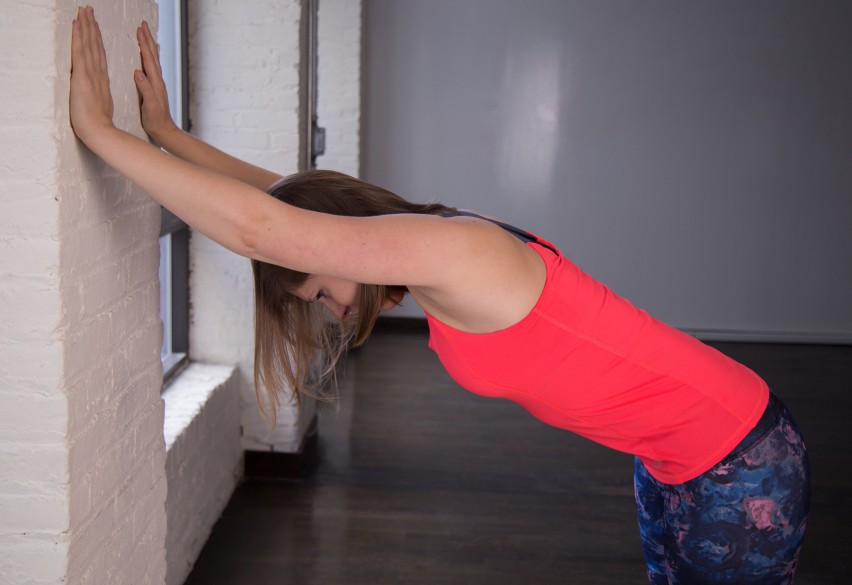
Place both hands on a wall so they form a 90-degree angle to your body. Walk feet back until arms are straight and bow, hinging forward at the hips. (Do not push on the wall, and do not allow your arms to raise up too high, in order to avoid a shoulder impingement.) Keep shoulder blades set back and avoid scrunching shoulders around the neck.
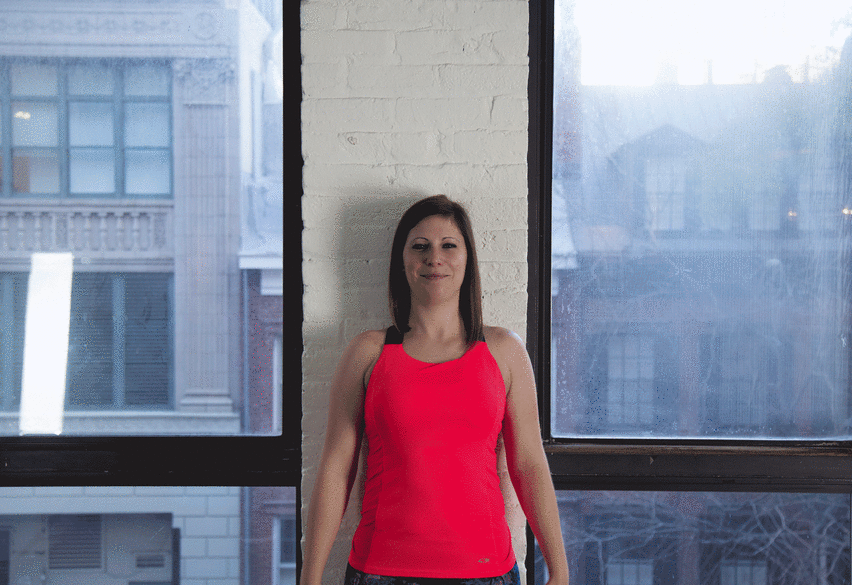
With your back to a wall, stand with palms facing out. Slowly bring arms up to make a "T" shape—keeping your arms and back in contact with the wall. Continue to bring arms up to make a "Y" shape, then an "I" shape, touching thumbs overhead. Focus on keeping shoulder blades flat against the wall (not allowing them to stick out or wing).
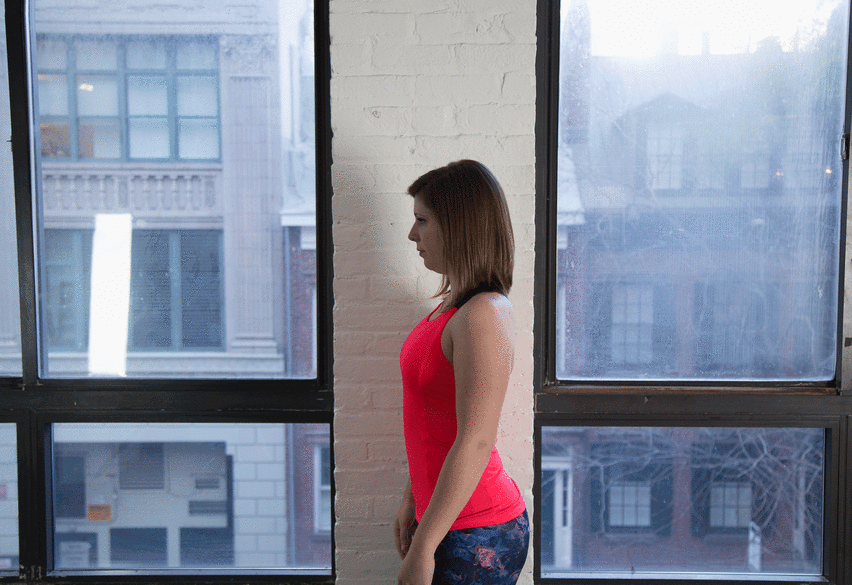
Standing perpendicular to a wall, make big, slow circles with your arm. Get as close to the wall as you can (coming into contact with it if possible). Repeat 10 times in each direction before turning the other way to rotate the opposite arm. Maintain good posture throughout, especially when moving forward: Do not slouch or round the back forward.
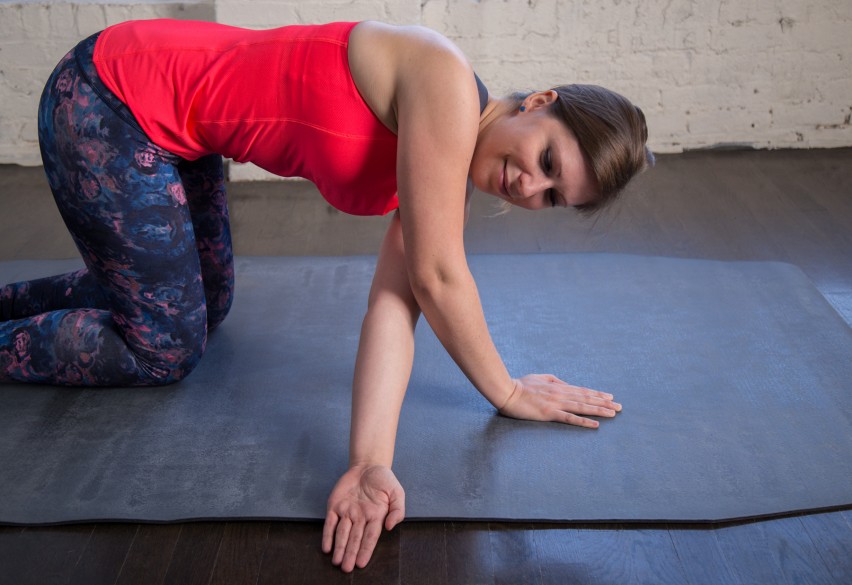
Start on all fours. Lift left hand off the ground and "thread" left arm through the space between right arm and right leg, letting the back of the left hand and arm slide along the ground. Allow the upper body (thoracic spine) to naturally rotate toward the right, but keep hips level. Stop pushing arm to the right at the point where your hips begin to open to the right. (This may mean less of a range of motion than what you could do if you continued to open.)
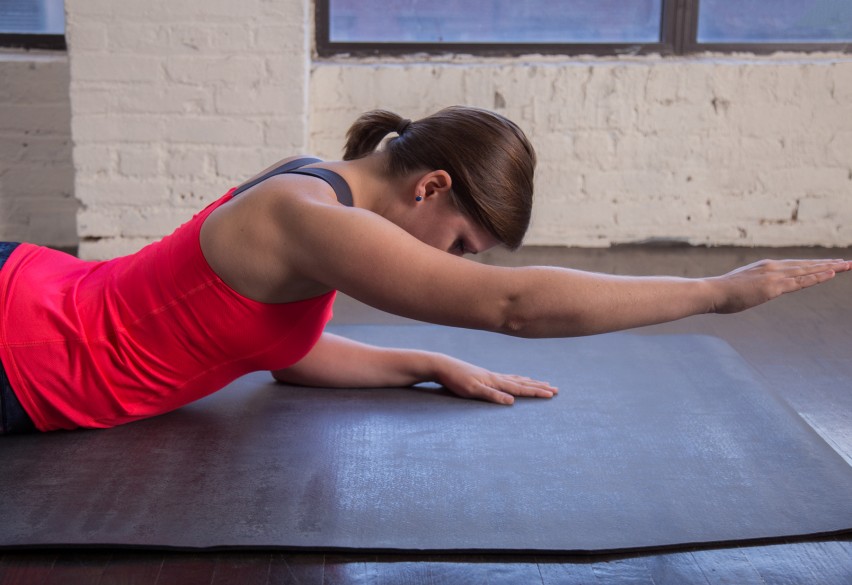
Lie facedown on the floor, with arms bent at your side and palms on the ground about even with your chest, fingertips facing forward. Peel chest up, leaving hands in the same position and feeling an arch in the upper back only (no pressure on the low back). Keep elbows squeezed close to the side of your body. Raise right hand off the ground, and straighten right arm, bringing bicep in line with ear if possible. Focus on not letting your shoulder raise up and not crunching your neck. Hold for about 5 seconds, then lower right arm and repeat on the other side.
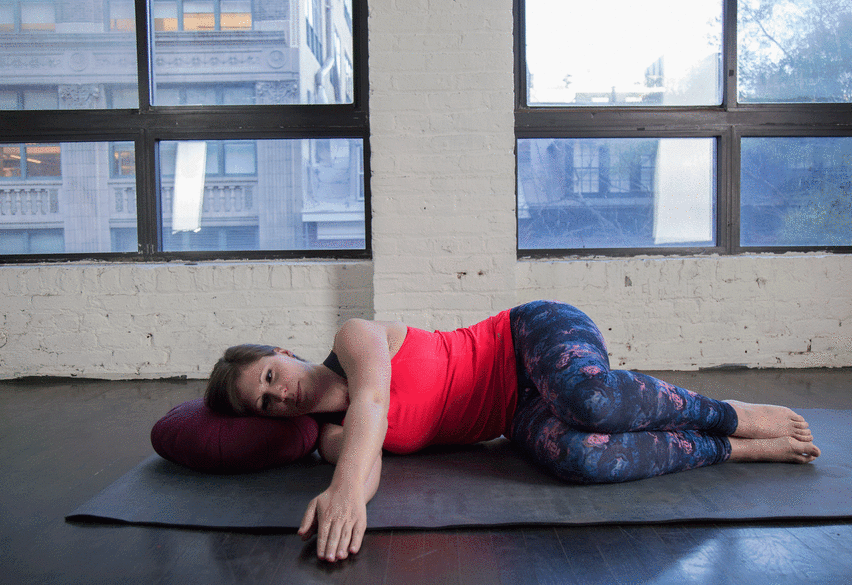
Lie on your right side with legs bent comfortably, so the spine is neutral, and right arm is straight and perpendicular to the body. With left arm on top of right arm, push left arm slightly forward first, then lift it straight up and rotate it back, making a large arch in the air. Let your left arm fall as far as possible to the left side, without allowing your hips to move in the direction of your arm. Allow your nose and gaze to follow the left arm, slowly turning the neck to the left. Move slowly, holding for a few seconds at the end of the stretch before returning to starting position. Repeat 10 times, then switch to the other side.
Special thanks to our model, Rebecca Young, physical therapist at ActiveCare Physical Therapy. Rebecca wears a C9 by Champion top and Lululemon pants.

Original article and pictures take http://greatist.com/move/stretches-for-tight-shoulders site
Комментариев нет:
Отправить комментарий
Примечание. Отправлять комментарии могут только участники этого блога.